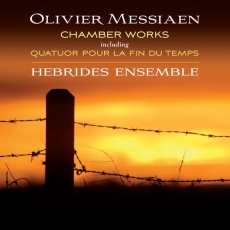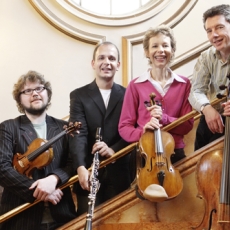Messiaen & Carter - Hebrides Ensemble - Music OMH
To mark the launch of their excellent CD of Messiaen Chamber Works , the Hebrides Ensemble gave a programme of works at Wigmore Hall by both the French composer and his American contemporary Elliott Carter.
The two composers were born just a day and an ocean apart and, as a celebration of their centenary year, this was as eloquent as anything we've heard in London so far.
Give a composer his freedom, a full orchestra and all the comforts of modern living and there's no guarantee that he'll come up with anything memorable. Put him in prison with an out of tune upright, a three-stringed cello and a bemused audience and he might just write a great work like Quator pour le fin du temps. I wouldn't want to perpetuate the tired cliché of art overcoming adversity but Messiaen does do something miraculous with the limited means at his disposal.
Of course, the details of that famous first performance are shaky at best, with the cellist claiming that his instrument actually had a full set of strings and disputing the size of the audience, but it must have been some event. Although a Friday evening at the Wigmore Hall can hardly be expected to approximate to the conditions in Stalag VIII-A in 1941, the Hebrides Ensemble succeeded in creating an extraordinary atmosphere.
The spellbinding clarinet solo in the third movement was as memerising as a snake charmer in the hands of Spanish clarinettist Maximiliano Martin and, while the later sections become as garishly ebullient as some of the mature works, the haunting violin that dominates the final movement returns us to a serenity and soberness that makes applause an intrusion.
The evening had begun with a short spiky exercise from Messiaen with his Pièce pour piano et quator à cordes, written late in his life (1991) as a tribute to the music publisher Alfred Schlee. It was followed by two Carter works, the well-known GRA for solo clarinet and the Quintet for piano and string quartet, composed when he was nearly 90.
Martin impressed with the colourful GRA, virtuoso playing making huge demands on the player while proving all too short for the listener. It resembles nothing so much as a game of cat teasing mouse (the title is the Polish word for "play"), with frantic pawing alternating with bashful pausing. The Quintet begins with a seemingly formless flow of strings and intermittent bashing on the piano developing into a comical dialogue, instruments chattering over each other and sounding like the sort of rhubarbing that goes on upstage in a drawing room comedy. Wheeling through various moods, the piece concludes with a much more grown-up conversation between the contestants, the piano squeezing in a final cheeky syllable. Delightful stuff beautifully played.
Throughout the evening, the ensemble - here comprising William Conway (Cello & Artistic Director), Alexander Janiczek (Violin), David Adams (Violin), Catherine Marwood (Viola), Philip Moore (Piano) and Maximiliano Martin (Clarinet) - played with great refinement and heartfelt intensity in a performance that was both enthralling and uplifting.
He may be the oldest and one of the most eminent of contemporary composers but much of Elliott Carter's work isn't readily available on disk. Maybe the Hebrides Ensemble should follow up their Messiaen CD with one of Carter chamber works. Perhaps they could include the recently New York-premiered Clarinet Quintet. How about it chaps?

